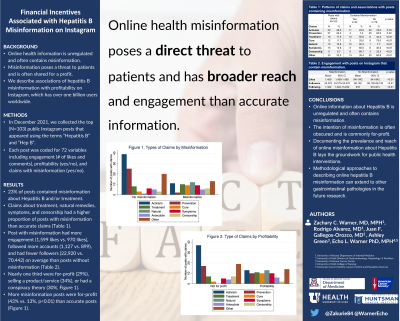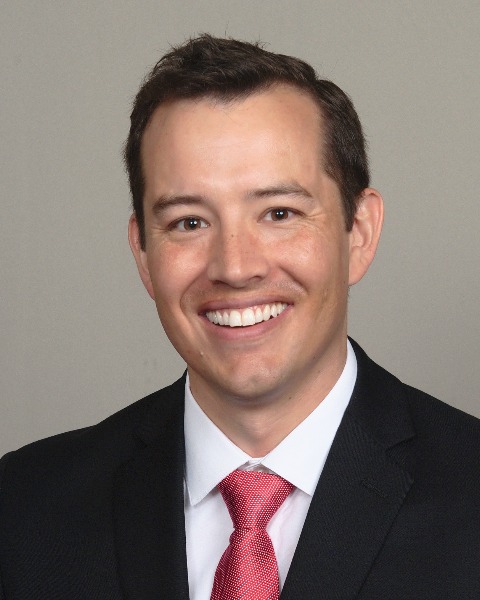Back


Poster Session C - Monday Afternoon
Category: Liver
C0498 - Financial Incentives Associated With Hepatitis B Misinformation on Instagram
Monday, October 24, 2022
3:00 PM – 5:00 PM ET
Location: Crown Ballroom

Has Audio

Zachary C. Warner, MD, MPH
University of Arizona
Saint George, UT
Presenting Author(s)
Zachary C. Warner, MD, MPH1, Rodrigo Alvarez, MD1, Juan F. Gallegos-Orozco, MD2, Echo Warner, PhD, MPH3
1University of Arizona, Tucson, AZ; 2University of Utah, Salt Lake City, UT; 3University of Utah College of Nursing, Tucson, AZ
Introduction: Online health information is vastly unregulated and often contains mis- and disinformation. Early studies suggest misinformation is often shared on social media by individuals and organizations for a profit. We describe associations of hepatitis B affiliated misinformation with profitability on the social media platform Instagram, which has over one billion monthly users worldwide.
Methods: In December 2021, we searched for publicly available posts using the terms “hepatitis b” and “hep b”. We removed duplicates from the top 55 posts for each term and coded N=103 posts using a validated misinformation codebook with 72 variables including: engagement (e.g., number of likes), user characteristics (e.g., # of followers, # following), profitability (e.g., for profit, selling product or service), and claims with misinformation (determined by medical experts). We applied two-tailed z-tests, chi-square tests, and linear regressions to examine associations between profitability and misinformation (outcome).
Results: Nearly a quarter of posts (n=24, 23%) contained misinformation about hepatitis B and/or hepatitis B treatment. Misinformation posts had more engagement on average (1,599 likes vs. 970 likes, p< 0.01), were following more accounts (1,127 vs. 889, p=< 0.01), but had fewer followers (mean: 22,920n vs. 70,442, p< 0.001) than accurate posts. Nearly one-third of posts about hepatitis B referenced a conspiracy theory (30%), were for-profit (29%), and were selling a product or service (34%) through Instagram. Significantly more misinformation posts were for profit (47% vs. 14%, p< 0.01) and were selling a product or service (43% vs. 13% p< 0.01) compared to accurate posts. For-profit accounts (b=713, 95% CI 25-1401, p=0.04) and those selling a product or service (b=843, 95% CI 196-1490, p=0.01) were following significantly more accounts than their counterparts.
Discussion: Online health misinformation poses direct threat to patients and has broader reach and engagement than accurate information. Hepatitis B misinformation may exacerbate health disparities, given that financial incentives are difficult to distinguish, however our findings suggest that a high number of “following” accounts may be a marker for accounts seeking profitability off of Hepatitis B misinformation on Instagram. More research is needed to understand how exposure to health information can influence patient/caregiver behavior and downstream clinical and financial outcomes.
Disclosures:
Zachary C. Warner, MD, MPH1, Rodrigo Alvarez, MD1, Juan F. Gallegos-Orozco, MD2, Echo Warner, PhD, MPH3. C0498 - Financial Incentives Associated With Hepatitis B Misinformation on Instagram, ACG 2022 Annual Scientific Meeting Abstracts. Charlotte, NC: American College of Gastroenterology.
1University of Arizona, Tucson, AZ; 2University of Utah, Salt Lake City, UT; 3University of Utah College of Nursing, Tucson, AZ
Introduction: Online health information is vastly unregulated and often contains mis- and disinformation. Early studies suggest misinformation is often shared on social media by individuals and organizations for a profit. We describe associations of hepatitis B affiliated misinformation with profitability on the social media platform Instagram, which has over one billion monthly users worldwide.
Methods: In December 2021, we searched for publicly available posts using the terms “hepatitis b” and “hep b”. We removed duplicates from the top 55 posts for each term and coded N=103 posts using a validated misinformation codebook with 72 variables including: engagement (e.g., number of likes), user characteristics (e.g., # of followers, # following), profitability (e.g., for profit, selling product or service), and claims with misinformation (determined by medical experts). We applied two-tailed z-tests, chi-square tests, and linear regressions to examine associations between profitability and misinformation (outcome).
Results: Nearly a quarter of posts (n=24, 23%) contained misinformation about hepatitis B and/or hepatitis B treatment. Misinformation posts had more engagement on average (1,599 likes vs. 970 likes, p< 0.01), were following more accounts (1,127 vs. 889, p=< 0.01), but had fewer followers (mean: 22,920n vs. 70,442, p< 0.001) than accurate posts. Nearly one-third of posts about hepatitis B referenced a conspiracy theory (30%), were for-profit (29%), and were selling a product or service (34%) through Instagram. Significantly more misinformation posts were for profit (47% vs. 14%, p< 0.01) and were selling a product or service (43% vs. 13% p< 0.01) compared to accurate posts. For-profit accounts (b=713, 95% CI 25-1401, p=0.04) and those selling a product or service (b=843, 95% CI 196-1490, p=0.01) were following significantly more accounts than their counterparts.
Discussion: Online health misinformation poses direct threat to patients and has broader reach and engagement than accurate information. Hepatitis B misinformation may exacerbate health disparities, given that financial incentives are difficult to distinguish, however our findings suggest that a high number of “following” accounts may be a marker for accounts seeking profitability off of Hepatitis B misinformation on Instagram. More research is needed to understand how exposure to health information can influence patient/caregiver behavior and downstream clinical and financial outcomes.
Disclosures:
Zachary Warner indicated no relevant financial relationships.
Rodrigo Alvarez indicated no relevant financial relationships.
Juan Gallegos-Orozco: Allergan – Independent Contractor. Durect – Independent Contractor. Genfit – Independent Contractor. Gilead – Independent Contractor. Hanmi – Independent Contractor. Intercept – Independent Contractor. Mallinckrodt – Independent Contractor.
Echo Warner indicated no relevant financial relationships.
Zachary C. Warner, MD, MPH1, Rodrigo Alvarez, MD1, Juan F. Gallegos-Orozco, MD2, Echo Warner, PhD, MPH3. C0498 - Financial Incentives Associated With Hepatitis B Misinformation on Instagram, ACG 2022 Annual Scientific Meeting Abstracts. Charlotte, NC: American College of Gastroenterology.


